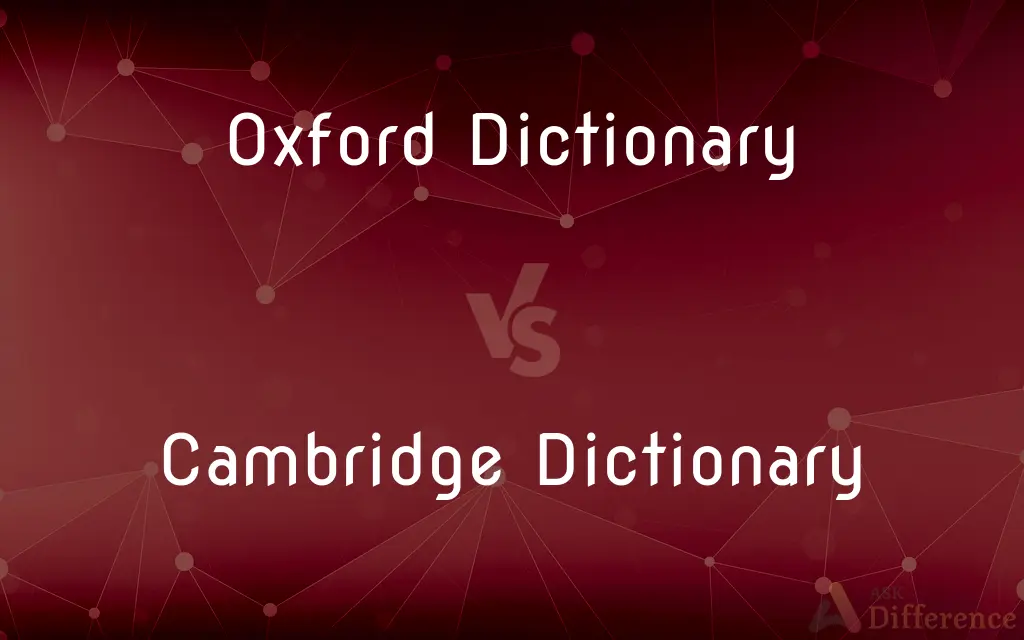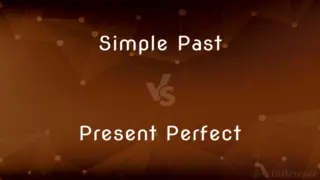Oxford Dictionary vs. Cambridge Dictionary — What's the Difference?
Edited by Tayyaba Rehman — By Fiza Rafique — Published on November 3, 2023
The Oxford Dictionary is a comprehensive lexicon published by Oxford University Press, while the Cambridge Dictionary is a detailed dictionary released by Cambridge University Press. Both serve as authoritative references for English language and grammar.

Difference Between Oxford Dictionary and Cambridge Dictionary
Table of Contents
ADVERTISEMENT
Key Differences
The Oxford Dictionary and the Cambridge Dictionary are among the most renowned English dictionaries globally. The Oxford Dictionary, often referred to as the OED (Oxford English Dictionary), boasts a rich history and is lauded for its extensive compilation of English words, their origins, and evolutions. Meanwhile, the Cambridge Dictionary is revered for its clarity, precise definitions, and user-friendly approach, making it a favorite among learners of the English language.
In terms of origins, the Oxford Dictionary has its roots in the late 19th century, with aspirations to be a comprehensive record of the English language. The Cambridge Dictionary, on the other hand, originated in the 1990s, leveraging Cambridge University's expertise in linguistics and English language teaching. While both dictionaries strive to provide accurate definitions, they sometimes offer different perspectives, nuances, or usage examples due to their unique histories and focuses.
Another distinguishing aspect is their target audiences. The Oxford Dictionary, especially in its complete edition, caters to scholars, writers, and researchers, given its exhaustive list of words and detailed etymologies. The Cambridge Dictionary, with its clear definitions and emphasis on contemporary usage, often appeals to English learners and educators.
Accessibility is also a notable difference. Both dictionaries have made significant strides in the digital realm. The Oxford Dictionary offers a vast online platform with regular updates, while the Cambridge Dictionary also provides online resources, complete with pronunciation guides, grammar tips, and word frequency details based on the Cambridge English Corpus.
Comparison Chart
Origin
Late 19th century
1990s
ADVERTISEMENT
Primary Audience
Scholars, writers, researchers
English learners, educators
Emphasis
Comprehensive word list with detailed etymologies
Clear definitions, contemporary usage
Online Presence
Extensive online platform with regular updates
Online resources with pronunciation and word frequency details
Published By
Oxford University Press
Cambridge University Press
Compare with Definitions
Oxford Dictionary
It's known as a definitive record of the English language.
The Oxford Dictionary's reputation as a comprehensive resource is unparalleled.
Cambridge Dictionary
It provides word frequency details based on the Cambridge English Corpus.
The Cambridge Dictionary offers insights into how often words are used in modern texts.
Oxford Dictionary
The Oxford Dictionary is both a printed and digital resource.
I accessed the Oxford Dictionary online to check a word's pronunciation.
Cambridge Dictionary
The Cambridge Dictionary is a widely-used English dictionary produced by Cambridge University Press.
English learners often gravitate towards the Cambridge Dictionary for clear definitions.
Oxford Dictionary
The Oxford Dictionary is an extensive English dictionary published by Oxford University Press.
Scholars often refer to the Oxford Dictionary for etymological details.
Cambridge Dictionary
The Cambridge Dictionary is both a print and digital resource.
To understand a new word's context, I turned to the Cambridge Dictionary online.
Oxford Dictionary
The dictionary offers detailed word origins and histories.
For a deep dive into word origins, the Oxford Dictionary is the go-to choice.
Cambridge Dictionary
The dictionary offers online tools for pronunciation and grammar.
I used the Cambridge Dictionary's online tools to perfect my pronunciation.
Oxford Dictionary
Often abbreviated as OED.
The OED is a valuable tool for any English language enthusiast.
Cambridge Dictionary
It emphasizes modern usage and learner-friendly definitions.
The Cambridge Dictionary showcases how words are used in today's context.
Common Curiosities
And the Cambridge Dictionary?
The Cambridge Dictionary is published by Cambridge University Press.
What is the Oxford Dictionary primarily known for?
The Oxford Dictionary is renowned for its comprehensive coverage of the English language and detailed etymologies.
How is the Cambridge Dictionary distinct?
The Cambridge Dictionary is notable for its clarity, learner-friendly definitions, and emphasis on contemporary usage.
Which has been around longer, the Oxford Dictionary or the Cambridge Dictionary?
The Oxford Dictionary has a longer history, originating in the late 19th century.
Who publishes the Oxford Dictionary?
The Oxford Dictionary is published by Oxford University Press.
Which dictionary is more detailed in terms of word origins?
The Oxford Dictionary is particularly detailed in providing word origins and histories.
How often are the online versions of these dictionaries updated?
Both dictionaries regularly update their online platforms, reflecting contemporary language changes and new word additions.
Which dictionary offers insights on word frequency in modern English?
The Cambridge Dictionary provides word frequency details based on the Cambridge English Corpus.
Which dictionary is more learner-centric?
The Cambridge Dictionary is designed with English learners in mind, offering clear and accessible definitions.
Are there pronunciation guides in both dictionaries?
Yes, both the Oxford and Cambridge dictionaries offer pronunciation guides for words.
Which dictionary would an academic or researcher likely prefer?
While both are reputable, an academic or researcher might lean towards the Oxford Dictionary for its exhaustive depth and etymological details.
Is the Oxford Dictionary also referred to by another abbreviation?
Yes, it's often abbreviated as OED, standing for Oxford English Dictionary.
Do both dictionaries provide online resources?
Yes, both the Oxford Dictionary and the Cambridge Dictionary have online platforms with various tools and resources.
Are there mobile apps available for both dictionaries?
Yes, both the Oxford Dictionary and the Cambridge Dictionary have mobile apps for on-the-go access.
Can I find idiomatic expressions in these dictionaries?
Yes, both the Oxford Dictionary and Cambridge Dictionary include idioms and their meanings.
Share Your Discovery

Previous Comparison
Nintendo Wii vs. Nintendo Wii U
Next Comparison
Simple Past vs. Present PerfectAuthor Spotlight
Written by
Fiza RafiqueFiza Rafique is a skilled content writer at AskDifference.com, where she meticulously refines and enhances written pieces. Drawing from her vast editorial expertise, Fiza ensures clarity, accuracy, and precision in every article. Passionate about language, she continually seeks to elevate the quality of content for readers worldwide.
Edited by
Tayyaba RehmanTayyaba Rehman is a distinguished writer, currently serving as a primary contributor to askdifference.com. As a researcher in semantics and etymology, Tayyaba's passion for the complexity of languages and their distinctions has found a perfect home on the platform. Tayyaba delves into the intricacies of language, distinguishing between commonly confused words and phrases, thereby providing clarity for readers worldwide.












































